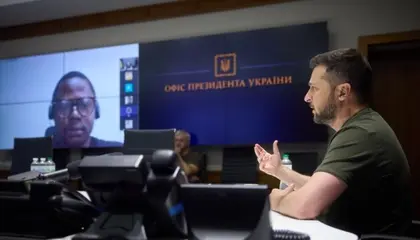Support for Ukraine has predominantly come from Europe and the United States. However, it appears that things are now changing.
On Tuesday, President Zelensky spoke with the President of Guinea-Bissau. Following their conversation, Zelensky Tweeted that he had had “the first conversation in bilateral relations’ history with President of Guinea-Bissau, Umaro Sissoco Embaló. Congratulated Guinea-Bissau leader on election as ECOWAS Chairman. Discussed support for Ukraine in international organizations. Noted Ukraine’s readiness to be a food security guarantor in the region.”
JOIN US ON TELEGRAM
Follow our coverage of the war on the @Kyivpost_official.
During a planned phone call last week, French President Emmanuel Macron told Zelensky that during his recent trip to Cameroon, Benin, and Guinea-Bissau, Macron had been successful in increasing those nation’s support to condemn Russia’s ongoing brutal aggression against Ukraine.
Macron’s trip coincided closely with that of Russian Foreign Minister Sergei Lavrov, who had travelled the continent seeking to bolster support for his heavily-sanctioned Russian homeland.
In information spread by Russia Today and other propaganda sources, Russia has frequently painted the invasion of Ukraine as being a war against Western imperialism. “Fighting against the imperialism of colonizers” was an often-cited line of rhetoric used by the Soviet Union and in Africa, which Russia has been seeking to brush-off and to recycle in the modern context of Ukraine.

Zelensky Meets CIA Director William Burns in Ukraine
Turning the Soviet paradigm, now used by Russia, on its head, while participating in a conference call with African members of the press, Zelensky referred to Russia as a “colonizer” that “wants to destroy our state.”
During the press conference, the Ukrainian leader reminded the press that Russia’s myths of being “another option” for Africa was false, as Russia could provide them little – according to Zelensky, less than 1% of investment in Africa comes from Russia.
Zelensky continued, “Russia does not invest in you [Africa]. She invests in political terms. They say that they are the heirs of the USSR.”
In contrast to the strong economic and military support given by US and European leaders, the latter of which make regular trips to Kyiv, support from the developing world has been lackluster.
To date, Ukraine has made minimal effort to reach people who live there with facts on the current situation in Ukraine. The results of this could be seen clearly during the United Nations vote on Ukraine held in the wake of the Russian invasion: 17 African nations voted to abstain, eight countries were absent from the vote, Eritrea was the only country to vote against Ukraine; and the rest of the countries on the continent voted in favor of Ukraine, with the exception of Western Sahara which is not a United Nations member state.
Last month, Guatemalan President Alejandro Giammattei visited Ukraine. His arrival marked the first time in twelve years that one of the thirty-three Latin American presidents had visited Kyiv.
You can also highlight the text and press Ctrl + Enter






